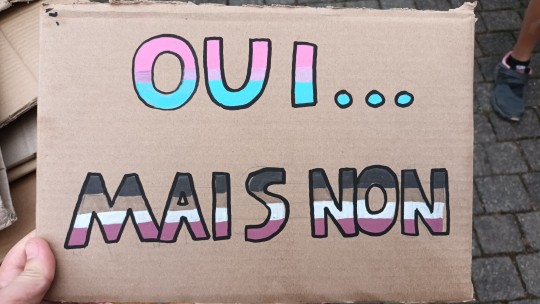#bagaitte
Text
allez les baguettes, on go signer
45 notes
·
View notes
Note
Hi! I’m starting to learn French and one thing that’s both cool and weird to me is how everything is gendered in a way (referring to someone/whose saying the statement/etc.) and I was wondering how that relates to people who identity as non-binary or gender fluid in France? Are there equivalents to they/them pronouns or neo pronouns in French?
I do plan on doing my own research about this but I figured since I love your blog and you’re really open about different cultural lgbtq+ communities I’d try here first!
That's an awesome question... with a complicated answer lmao. So buckle up and bear with me !
Basically, you can't be non-binary in French. The community found ways to do it but it's not mainstream. Most of the time, they're going to get misgendered or will have to misgender themselves to get understood.
Some things I'm going to list here are not proper French. Actually, they can even be forbidden in some circumstances, according to the law (the use of inclusive language, and more specifically le point médian, was made illegal in schools in 2021 for ex) or simply because your company etc forbids it. So use this wisely, there is a time and place for inclusive language in France.
That said, things have greatly developed over the last two decades. Which was partly because of the queer community and mainly because of feminists, who are tired of the way French erases women. More and more people are using inclusive language, at least in some circumstances and circles (for ex, i wrote my master's thesis in inclusive language and it was accepted bc i was in a leftist faculty). And inclusive language is debated as a serious issue now, which is saying something.
So, how do you use inclusive language in practice?
There are different ways, as it's informal and mostly new. People are still testing new things and trying out various methods. You can stick to one or alternate or mix them up.
Pronouns
Officially, there isn't a gender neutral pronoun. We don't have an equivalent to they. You're either talking about a man or a woman. If it's both, you use masculine pronouns ("masculine trumps feminine" rule). Same thing if you don't know the gender of the person ("masculin générique").
The most common neopronoun is "iel" (plural : iels), which is obviously a contraction of the masculine pronoun "il" and its feminine equivalent "elle". It works for nb folks or to avoid talking about someone's gender or to refer to a group of men and women. So it's equally used by the queer community and feminists.
I'm pretty sure other neopronouns exist but I can't think of any at the top of my head.
Choosing the right words
Sometimes, inclusive language is just about learning to use alternatives.
Instead of using gendered words, you can choose to use gender-neutral words or words "épicènes", aka words which are identical in their feminine and masculine form. For ex, instead of "homme politique" or "femme politique", you can use "personnalité politique". Personnalité is a feminine word but it's actually gender-neutral as you can use it for women and men alike. "Élève" (student) is épicène, as a female student and a male student are both referred to as "élève". Although épicène words as a gender-neutral option only work in their plural form, as you have to choose either a feminine or masculine article for the singular ("les élèves" is inclusive but it can only be "un" or "une" élève).
As good as this method is, it can be quite limitating. Your vocabulary will be drastically reduced and it can be quite hard to master that kind of speech so you can reach the point where you don't have to think everything over for ages before you open your mouth.
With oral French, you can take it a step further by choosing words that sound the same even if they have a different spelling. Ex, friend is "ami" or "amie" but it's pronounced the same way so if you say it out loud, people can't know how you're gendering it (as long as there isn't a gendered article/word with it ofc).
It avoids misgendering people but the downside is that, as masculine is considered neutral in French, people will often think : no gender specified = masculine. Not even because they're sexist or whatever, it's just so ingrained in our brains that it's a knee-jerk reaction.
That's also why most feminists often prefer to use explicitly feminine words when talking about women. For ex, they prefer the word "autrice" to "auteure" (female writer) because the second one sounds the same as its masculine version "auteur". And as previously mentionned, out loud, people will assume by default you're talking about a man. It's a big debate though, lots of women prefer words that sound masculine - going as far as refusing to use feminine words at all! Which sounds cool and gender-bending as fuck but in reality comes from feminine words traditionally seen as less legitimate and serious. Even today, if you look up the word empress "impératrice" in a French dictionary, the first definition that comes up is "wife of an emperor". "Woman ruling a country" comes second. Using a masculine title to refer to women can also be a way to mock them and show they're not welcome (a french deputy got fined in 2014 because he called the female president of the national assembly "Madame le président" and refused to use the feminine title "Madame la présidente").
Recently the tendency and official guidelines have been to feminize words, so I'd say go with that by default, but respect other people's choice if they specify how they want to be called.
Anyway I'm getting off-track but what I meant was that in French, if you avoid talking about gender, you're automatically erasing women (and nb people). So if you want to include everyone, you need to make it obvious.
Inclusivity as a statement
The most common way to make women and men equally visible is the "point médian" rule, which you can also use to refer to non-binary people as it avoids picking a specific gender.
Basically, it means pasting together the masculine and feminine forms of a word and using dots/middle dots/hyphens/parentheses/capital letters to create an inclusive word. For ex, instead of saying acteur (♂️) or actrice (♀️) for actor, you'll write "acteur.ice". For the plural form, there are two schools of thought : either you separate the feminine and masculine form AND the suffix used to signify the plural, or you don't. Aka, "acteur.ice.s" or "acteur.ices". Personally I prefer the second option because less dots makes it easier to read and faster to write, but it's an individual choice, both work.
There are two major downsides to this method : it only works in writing + it isn't doable for every word, as feminine and masculine words can be quite different and pasting them together that way would be unintelligible. Ex, "copain" and "copine" (friend or boyfriend/girlfriend depending on the context) would give something like "cop.ain.ine"...
You can work around that by choosing alternative words (as previously stated!). And it's still a pretty good method, especially as it works for any type of word (adjectives etc). Some people argue that it's hard to read and ugly but personally I think it's just a matter of habit (although it does pose a problem for people using screen readers). Be aware that it is the most controversial version of inclusive writing, as it's the furthest structure from how languages typically work.
If you don't like dots or want an alternative for oral speech, you can also straight up create new words that sound both feminine and masculine, making them gender-neutral. To use the previous example, "copain" and "copine" become "copaine".
Obviously, this only works if it's obvious which words they're based on. I think it's a great way to make French more inclusive but I'd advise against using it with uninitiated people as it would probably confuse them more than anything. This method is still quite niche.
An inclusive, yet binary language
As you've probably figured out, inclusive language remains quite binary in the way we approach it. It's more about making things both masculine and feminine than transcending gender and creating gender-neutral alternatives. Probably because inclusive language was more often a will to stop women from being erased rather than a non-binary friendly gesture.
Which means, there are also some rules that were created to avoid the "masculine trumps feminine rule" but don't allow room for non-binarity at all. I'll still explain them because they're interesting and you might encounter them at some point.
The proximity rule ("règle de proximité") is one of these. It existed in Ancient Greek and Latin but was dropped in Modern French in favor of the masculine trumps feminine rule. Basically, you gender things according to what's closest in the sentence instead of systematically using masculine words to gender a mixed group. For ex, instead of saying "Les hommes et les femmes sont beaux" you say "Les hommes et les femmes sont belles", as the subject "femmes" is closer to the adjective "beau/belle" than "hommes".
Another method is to systematically use both masculine and feminine words (which I personally find excruciating to write and read). Meaning, instead of writing "Les étudiants mangent à la cantine" (students eat at the cafeteria), you'll write "Les étudiantes et les étudiants mangent à la cantine".
This is mainly for the subject of the sentence : adjectives and such are gendered according to the masculine trumps feminine rule. The point is to explicitly include women, not to make the sentence unintelligible or gender-neutral.
When following this method, you also have to pay attention to whether you put the feminine subject first or the masculine. The rule is to follow alphabetical order. For ex, in "l'égalité entre les femmes et les hommes", "femmes" comes first because F comes before H. But in "Les auteurs et les autrices de roman", "auteurs" comes first because E comes before R. Etc.
This method is common as it's the only inclusive language you can get away with, given that it's a valid way of speaking French. It's even mandatory in some situations now, like in job descriptions for the french administration, in the spirit of gender equality.
So, how do I gender a non-binary person?
In short, you can use the pronoun iel + avoid gendered words and/or use the point médian and/or make up new words.
But keep in mind that if you're not talking to someone familiar with these rules, you'll have some explaining to do. And looots of people are still very anti inclusive language, because they're sexist and/or transphobic, ignorant, language purists, etc. A few years ago it was the thing to be angry about for conservatives and anti-feminists so it's still very controversial. But if you're in a trans inclusive queer space or talking with intersectionnal leftists, go for it !
I hope I covered everything (fellow french, don't hesitate to comment!) and didn't put you to sleep lmao. If you want to see some examples, you can look it up on Wikipedia or check #bagaitte on tumblr (it's the french queer tag) 😉
#it's a slow but steady effort!#the fact that it was accepted by my uni teachers shows how far we've come already#a decade ago it would have probably been dismissed#i don't even know if i was aware this existed a decade ago#😅#anyway THANK YOU for this ask#i hope it was comprehensive and helpful#ask#language inclusif#écriture inclusive#inclusive language#upthebaguette#bagaitte#french#languages
1K notes
·
View notes
Text
Bonjour ! Je fais mon mémoire de master sur la place du français au sein des tags d'Archive of our Own. Afin d'avoir la perspective des utilisateur.ices du site, j'ai créé un petit sondage, et ça m'aiderait grandement si certain.es (ou beaucoup) d'entre vous pouviez y participer.
----
Hello! I'm doing my master's thesis on the French language is used in Archive of our Own's tagging system. I created a survey to collect users' perspectives and I would be very grateful if some (maybe many!) of you could take a few minutes and fill it in.
204 notes
·
View notes
Text


je suis désolée mais ce déguisement de woke me bute, le journalisme d'investigation dans sa forme la plus pure
#nora tu as déjà une tête d'étudiante de littérature végétarienne y avait pas à forcer comme ça#upthebaguette#french side of tumblr#bagaitte#on dirait un personnage de second plan dans une série disney channel je peux pas
239 notes
·
View notes
Text
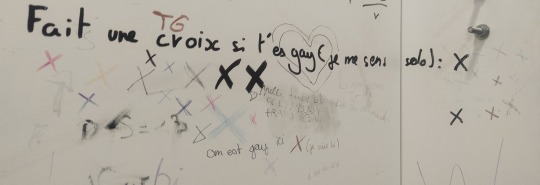
j'ai failli mettre une croix puis je me suis rendu compte que g écrit ça quand j'avais genre 14 ans et que je connaissais presque personne de queer j'avais complètement oublié wtf
#tf when u go to the library bathroom for the first time in like 4 years and find a glimpse of your 14 year old self?#i mkght've been 13 actually idk#and seeing all the crosses#ahhhhhh#public bathrooms are a place of community actually#bagaitte
121 notes
·
View notes
Text
J'ai sorti "ça part en cishet" à une réunion queer et ça a tellement faut marrer tout le monde qu'on a pas pu continuer la discussion pendant 5 bonnes minutes.
99 notes
·
View notes
Text
France is trying to force browsers to block a blacklist of websites. This is not good. Yes, most websites in this blacklist are fraudulent, but if this law passes in France, it will be an example of what the other governments can force browsers to do.
I know this website is mostly American, so YES, it might affect you later on, kill it before it grows.
We all know they start taking our freedom "for the greater good" until they use it for their own agenda once the lobbyist get in.
Do note they're trying to make it go through the Parlament very quickly and as discreetly as they can. They presented it before holidays and the vote is in autunm.
Here is a link to the Firefox petition and to the french article.
97 notes
·
View notes
Text
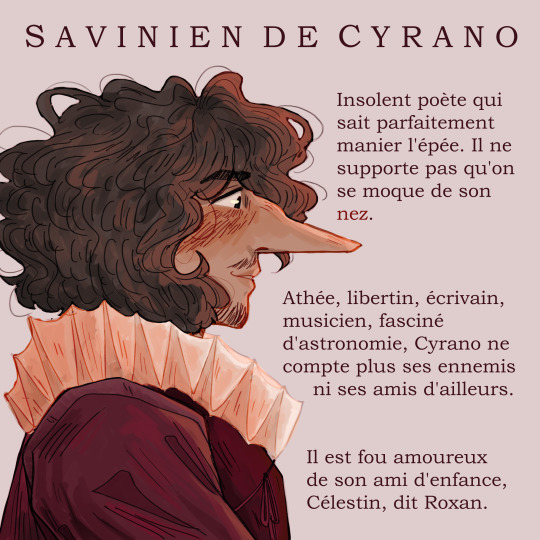

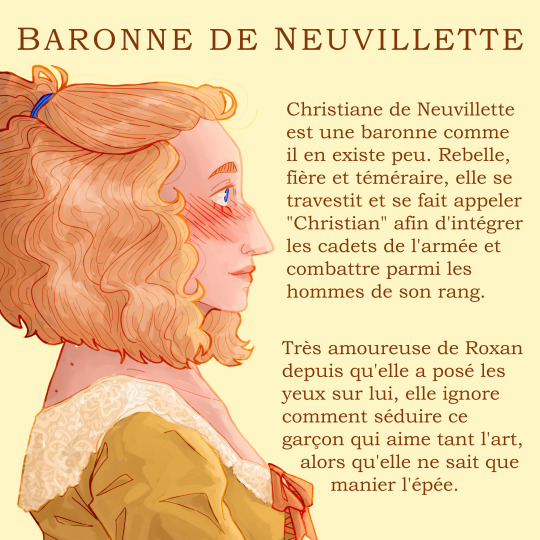
Le triangle.
Kickstarter du projet ici !
#cyrano aimait les hommes zine#cyrano aimait les hommes#cyrano de bergerac#fanzine#bagaitte#merlin draws
53 notes
·
View notes
Text
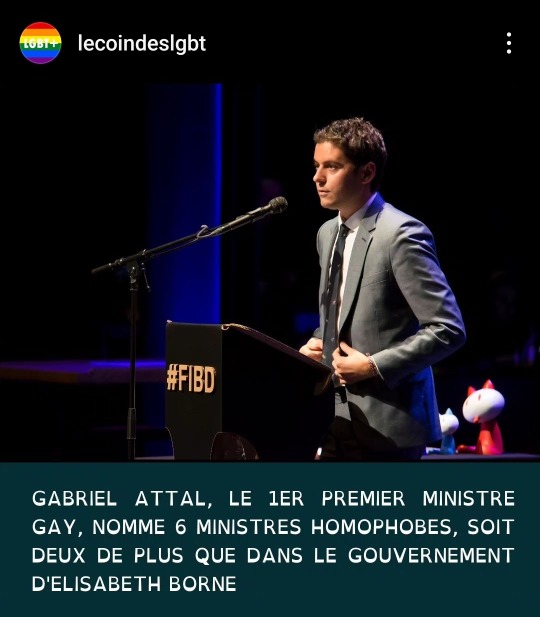
"Gabriel Attal, France's gay prime minister (appointed on Jan 9th 2024), appoints 6 homophobic ministers, which is 2 more than in the previous government"
#est-ce qu'on est étonnés? non.#les macronistes c'est vraiment solidarité de classe avant quoique ce soit d'autre hein#bagaitte#upthebaguette
58 notes
·
View notes
Text
Des nouvelles du fameux sondage

Comme promis, je veux partager avec vous les résultats du sondage que vous m'avez aidée à mener, et voir quelles conclusions il est possible d'en tirer. Je vais faire ça petit à petit, pour que ce soit plus facile à digérer pour vous et plus facile à rédiger pour moi (sachez en tout cas que la rédaction de mon mémoire est enrichie par vos contributions) donc
Dans cette première question, je vous avais demandé quelle variante du français vous parliez, et comme vous pouvez le voir, c'est un français de France sweep. C'est tout à fait normal : le post du sondage avait été taggué avec beaucoup des tags associés à la communauté des français sur Tumblr, à savoir #french side of tumblr, #upthebaguette ou encore #bagaitte. Je les re-taggue ici afin que toute la France puisse se réjouir de sa victoire, que je lui concède plus facilement que celle de la Coupe du Monde 2018.
J'ai choisi ces tags en particulier car je savais que c'était là que j'avais des chances de trouver de l'activité francophone, mais si ce mémoire avait une portée linguistique plus importante, j'aurais bien pris le soin d'utiliser des tags associés à des communautés francophones non françaises.
Cependant, l'hégémonie française n'est pas une conquête intégrale puisque j'ai eu le plaisir de voir des réponses de toutes les communautés linguistiques de la francophonie. C'est la Belgique qui nous a offert le plus de réponses après la France, suivie du français comme langue seconde, le Canada, la Suisse et enfin l'Afrique francophone. Bravo à tout le monde pour votre participation !
(Les chiffres représentés ici sont représentatifs de leur état le 15 février 2024 et sont susceptibles de changer dans le futur)
20 notes
·
View notes
Text
[french below]
Please help me spread the word! I co-created a french speaking support server on discord for people with chronic gynecological conditions (endometriosis, adenomyosis, PCOS, chronic pelvic pain, etc)
Aidez-moi à faire passer le message! J'ai co-créé un serveur discord de soutien pour toutes les personnes atteintes de pathologies gynécologiques chroniques (endométriose, adénomyose, SOPK, douleurs pelviennes chroniques, et autres). C'est un serveur safe LGBT 🌈 et inclusif pour offrir une alternative à tous les groupes de soutien cis-centrés qui existent autour de ces thématiques. Ouvert à tous-tes, avec ou sans diagnostic ! 💗
https://disboard.org/fr/server/1110166893366628452
#bagaitte#upthebaguette#french side of tumblr#endometriosis#pcos#adenomyosis#chronic illness#chronic pain
79 notes
·
View notes
Text
ça me saoule un peu parce que je perds tous les mutus films que j'avais sur twitter vu que ce réseau est en train de crever et qu'ils partent toustes sur insta mdr pas question que j'aille sur ce réseau du démon, moi je bascule tout sur tumblr snirf
du coup bjr si vous aimez parler de films svp on se follow???
54 notes
·
View notes
Text
ce sondage est ptet trop niche pour avoir des résultats mais c pô grave
*néopronoms du style iel, ael, aol...
45 notes
·
View notes
Photo





Marinette (2023) - Trailer
146 notes
·
View notes
